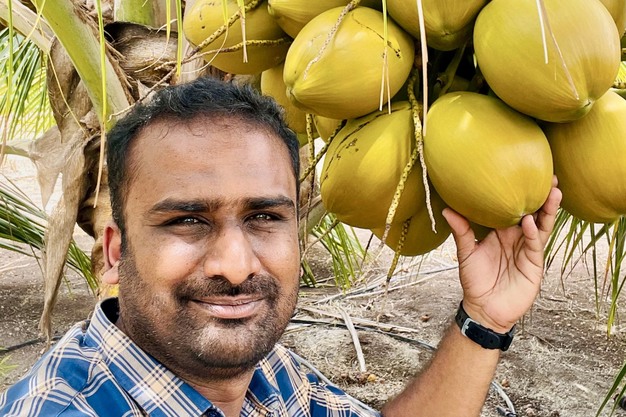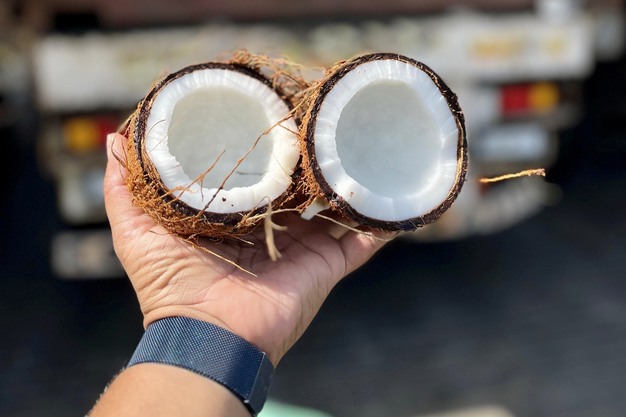India's coconut exports are expanding steadily across international markets, says Prithvi Raj, Founder and CEO of grower-exporter The Coconut Company India. He mentions the reason behind successful shipments is a sharp focus on quality and the right variety. "We export up to 200 containers each year, depending on the market and demand, and our coconuts reach about 28 countries. The West Coast Tall variety grown in Tamil Nadu is very suitable for export. Semi-husked, not fresh coconuts, is what the export market currently demands from India."
The export process is rooted in precision and timing. Raj explains, "We harvest every 60 days. After 10, 20, or even 30 days, the coconuts are dehusked for export to different destinations depending on their colour and shelf life. Coconuts dehusked 10 days after harvest, called biscuit colour, have a shelf life of 20 days and are shipped mainly to Dubai. The 20-day half-brown nuts go to Oman and Qatar, lasting 45 days, while the full-brown nuts, matured for 30-45 days, are destined for the UK, Europe, and Canada, offering up to 90 days of shelf life. "It's all about matching harvest and post-harvest handling to specific export needs," he adds.
 © The Coconut Company India
© The Coconut Company India
Coconut export failures majorly come from poor quality, Raj says, pointing out the importance of collaborating with trusted sources. "Purchasing coconuts outside the established Pollachi area for a lower price often leads to quality and fungal issues. The West Coast Tall variety's reliability, combined with rigorous dehusking and natural shade drying, keeps spoilage low and customer trust high."
While demand remains strong in the Middle East and Europe, Raj highlights a price fluctuation challenge each year. He notes, "As soon as Karnataka coconuts hit the Dubai market, prices sometimes collapse by 30-40%. This is mainly due to new entrants in the market ignoring post-harvest handling specifications." Raj emphasizes that in reality, quality must come first, not just price.
Demand for Indian coconuts is strongly driven by religious and cultural practices both domestically and in export markets. "Raw coconuts are essential for temple rituals, pujas, and hospitality in countries with a large Indian diaspora," says Raj, who exports coconuts to the Middle East, UK, Canada, and Europe for these purposes.
 © The Coconut Company India
© The Coconut Company India
The future of Indian tender coconut exports also holds promise, but awareness needs to be raised regarding certain malpractices, Raj mentions. "Tender coconut is growing in popularity worldwide, with Vietnam and Sri Lanka taking the lead, but India's use of banned insecticides like monocrotophos is creating a dent in its potential. The market needs a push for cleaner production and better standards to compete globally."
Looking ahead, Raj shares that Indian coconuts may gain share in international markets through strict quality control, safer farming practices, and value-added products like frozen chutneys, coconut chunks, and powder. "The market is evolving from raw coconuts for rituals to packaged, convenient formats that suit modern lifestyles. For now, Indian coconut exports will continue to rely on a blend of tradition and technical expertise, supported by the right variety, careful handling, and an eye on global standards."
For more information:
Prithvi Raj
The Coconut Company India
Tel: +91 88 70 286 018
Email: [email protected]
www.thecoconutcompany.org
